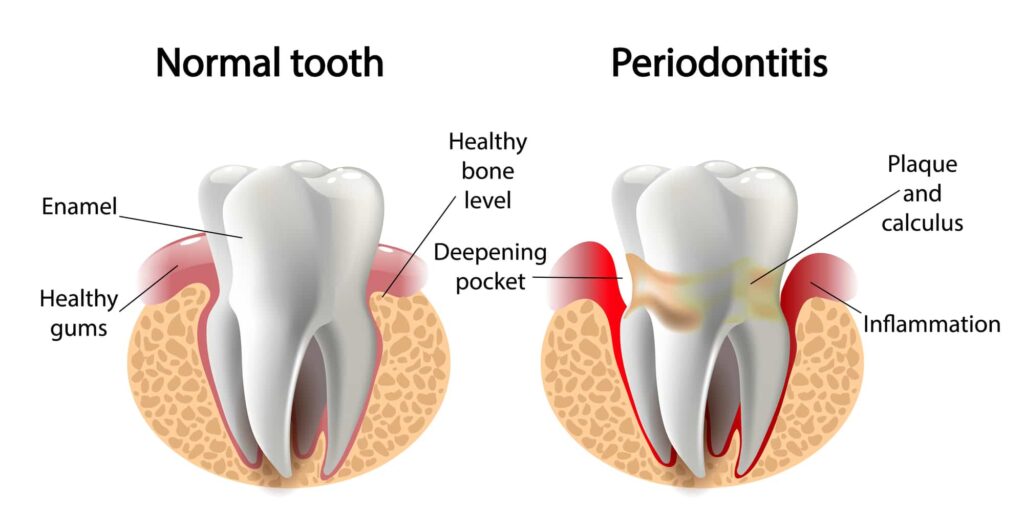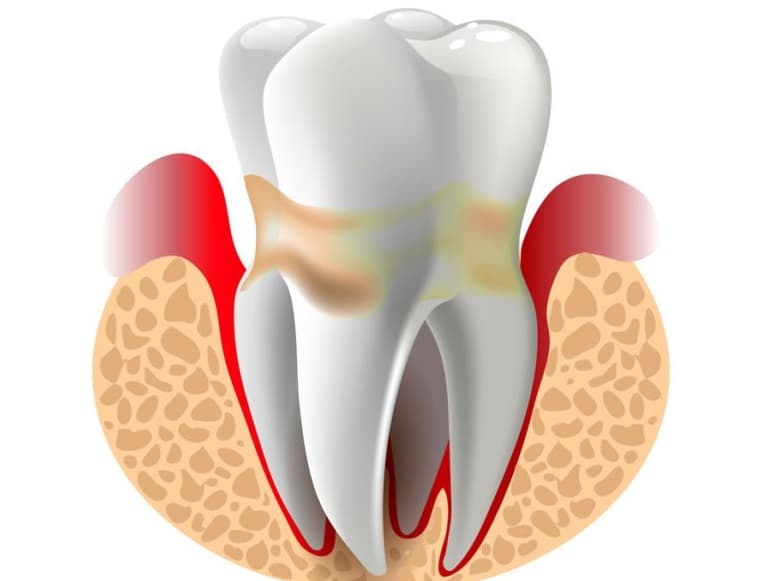Periodontitis Treatment in Fort Lauderdale
Home » Periodontitis Treatment in Fort Lauderdale
The Right Partners for Your Periodontal Needs
A healthy smile starts with a healthy gum line. Symptoms like swollen, bleeding gums or persistent bad breath may indicate periodontitis, a severe form of gum disease.
We offer expert Periodontitis Treatment in Fort Lauderdale, designed to restore gum health, protect your teeth, and prevent further complications.
At All Smiles Dental, Dr. Alvarado and her expert team bring extensive experience in periodontics, implantology, and endodontics to deliver outstanding care.
We collaborate closely with dental professionals and specialists to achieve the best possible outcomes for every patient.
Our commitment is not just to provide the top periodontist care, but to ensure tailored solutions and advanced expertise.
Whether it’s advanced gum care or restorative procedures, we’re here to ensure our patients leave with healthier smiles and renewed confidence.
What is Periodontal Disease?
Periodontal disease, also known as gum disease, is a serious infection of the gums caused by plaque buildup.
Over time, it can lead to gum inflammation, bleeding, and even tooth loss if untreated. This condition affects not only your oral health, potentially causing issues like heart disease and diabetes.
At All Smiles Dental, our periodontal treatment dentists in Fort Lauderdale offer advanced care to combat gum disease.
We focus on restoring gum health and protecting your smile for the long term.


Common Symptoms of Periodontitis
- Red, swollen, or tender gums
- Gums that bleed easily during brushing or flossing
- Receding gums or teeth that appear longer
- Persistent bad breath
- Loose or shifting teeth
- Painful chewing
Whenever you experience any of these symptoms, seek medical attention as soon as possible. Reach out to us.
Comprehensive Periodontal Care at All Smiles Dental
All Smile Dental provides a range of cutting-edge treatments for gum health, ensuring effective and gentle care:

Laser Therapy
Using gentle pulses of light, our laser technology removes harmful bacteria with precision, leaving healthy tissue intact. This modern approach offers minimal discomfort and faster healing compared to traditional methods.

Osseous Surgery (Pocket Reduction Surgery)
This procedure targets deep gum pockets by removing tartar and bacteria from tooth roots. It helps prevent further bone loss, reduces bacterial spread, and supports effective oral hygiene practices at home.
Scaling & Root Planing
As a deep-cleaning method, this treatment removes plaque and tartar below the gum line. It’s an effective way to address gum disease in its early stages and prevent it from worsening.

Guided Bone Regeneration
By placing barrier membranes under the gums, we encourage natural regrowth of bone and gum tissue, restoring a healthy oral structure and improving gum stability.
Frenectomy
This quick procedure reduces an overly prominent frenum, which can interfere with proper oral function and support healthier gum and bone structures.

Flap Surgery
When gum disease becomes severe, this procedure lifts the gums for deep cleaning underneath. It’s often used when antibiotics or other non-surgical methods are insufficient.
Preventing Periodontitis
A good oral hygiene routine and regular dental examinations are the most effective methods for preventing periodontitis.
Dr. Natalia Alvarado provides the most current periodontitis treatment options, backed by years of experience and continued education in the latest dental techniques.
Her focus on patient care means that you receive the quality service you deserve!

See Why Patients Trust Us for Periodontitis Treatment in Fort Lauderdale
EXCELLENTTrustindex verifies that the original source of the review is Google. Dr Alvarado and her team are super patient, very nice and professional. Highly recommended!Trustindex verifies that the original source of the review is Google. Very nice place!!!! The staff is welcoming and the environment was warm and friendly. Great dental experienceTrustindex verifies that the original source of the review is Google. I came from MN looking for a really good lip filler and botox clinic and Dr. Natalia Alvarado did not disappoint! I would highly recommend her. every is so friendly and listens to every little concern you might have. Definitely coming back in the future :))Trustindex verifies that the original source of the review is Google. Dr. Natalia and her team are really nice with their clients, they have been giving me the best service, since I enter. I am really happy with Dr. Natalia, Stephanie and the entire team.Trustindex verifies that the original source of the review is Google. Best of the best! From my dental to Botox needs- there’s nobody I trust more! Dr. Alvarado and her amazing staff always go above and beyond to make you feel comfortable and relaxed during your visit!Trustindex verifies that the original source of the review is Google. Great experience and comforting as always.Trustindex verifies that the original source of the review is Google. Always a great experience!Trustindex verifies that the original source of the review is Google. I always leave this office with a big clean smile on my face! The customer service is excellent, everyone is very welcoming and helpful. The office is so clean and beautiful. Additionally, Dr. Natalia is very thorough with making the best treatment plan that works for you personally. I cannot say one bad thing about this place…. If I could rate 100 stars I would!!!Trustindex verifies that the original source of the review is Google. Best Dentist ever, highly recommend
Frequently Asked Questions
During your consultation, a Periodontist in Ft Lauderdale will evaluate your gum health, check for signs of disease, and discuss any symptoms you’ve noticed. This may include taking X-rays, measuring gum pockets, and creating a personalized treatment plan to restore oral health.
Common symptoms include swollen, red, or tender gums, persistent bad breath, bleeding during brushing, receding gums, loose teeth, and changes in how your bite feels. Early detection is key to preventing progression.
Certain genetic predispositions can make individuals more prone to periodontal diseases, as can systemic conditions like diabetes, hormonal changes, or autoimmune disorders. Smoking, medications affecting saliva flow, and poor oral hygiene habits can further exacerbate these risks.
Why Choose All Smiles Dental for Periodontitis Treatment?
Keep your smile and overall health on track by avoiding gum disease. Taking the first step towards restoring your gum health begins with a consultation with Dr. Alvarado at All Smiles Dental.
No Insurance?



